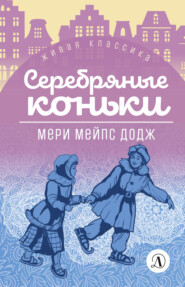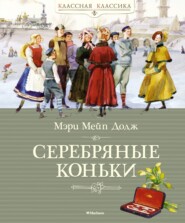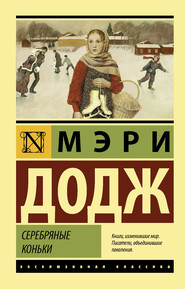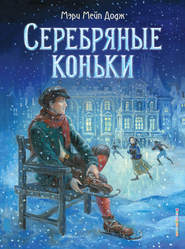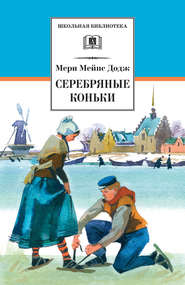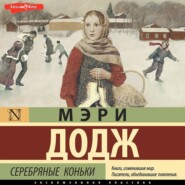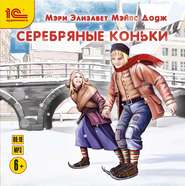По всем вопросам обращайтесь на: info@litportal.ru
(©) 2003-2025.
✖
Hans Brinker, or the Silver Skates / Серебряные коньки. Книга для чтения на английском языке
Настройки чтения
Размер шрифта
Высота строк
Поля
For an instant the boys were ahead, hurrahing with all their might – only for an instant, but even THAT was something.
This excitement over, they began to travel more leisurely and indulge in conversation and frolic. Sometimes they stopped to exchange a word with the guards who were stationed at certain distances along the canal. These men, in winter, attend to keeping the surface free from obstruction and garbage. After a snowstorm they are expected to sweep the feathery covering away before it hardens into a marble pretty to look at but very unwelcome to skaters. Now and then the boys so far forgot their dignity as to clamber among the icebound canal boats crowded together in a widened harbor off the canal, but the watchful guards would soon spy them out and order them down with a growl.
Nothing could be straighter than the canal upon which our party were skating, and nothing straighter than the long rows of willow trees that stood, bare and wispy, along the bank. On the opposite side, lifted high above the surrounding country, lay the carriage road on top of the great dike built to keep the Haarlem Lake within bounds; stretching out far in the distance, until it became lost in a point, was the glassy canal with its many skaters, its brown-winged iceboats, its push-chairs, and its queer little sleds, light as cork, flying over the ice by means of iron-pronged sticks in the hands of the riders. Ben was in ecstasy with the scene.
Ludwig van Holp had been thinking how strange it was that the English boy should know so much of Holland. According to Lambert’s account, he knew more about it than the Dutch did. This did not quite please our young Hollander. Suddenly he thought of something that he believed would make the “Shon Pull” open his eyes; he drew near Lambert with a triumphant “Tell him about the tulips!”
Ben caught the word tulpen.
“Oh, yes!” said he eagerly, in English, “the Tulip Mania – are you speaking of that? I have often heard it mentioned but know very little about it. It reached its height in Amsterdam, didn’t it?”
Ludwig moaned; the words were hard to understand, but there was no mistaking the enlightened expression on Ben’s face. Lambert, happily, was quite unconscious of his young countryman’s distress as he replied, “Yes, here and in Haarlem, principally; but the excitement ran high all over Holland, and in England too for that matter.”
“Hardly in England, I think,” said Ben, “but I am not sure, as I was not there at the time.”[115 - Хотя увлечение тюльпанами не получило в Англии такого распространения, как в Голландии, этот цветок вскоре сделался предметом спекуляции и достиг очень высокой цены. В 1636 г. тюльпаны публично продавались на Лондонской бирже. Еще в 1880 г. за луковицу платили по 15 гиней. Бен не знал, что в его время один тюльпан с луковицей «Фанни Кембл» был продан в Лондоне за 70 гиней с лишком.Маккей в своих «Записках о народных заблуждениях» рассказывает смешную историю об одном ботанике-англичанине, который случайно увидел луковицу тюльпана в теплице некоего богатого голландца. Не зная о ее ценности, ботаник вынул перочинный нож и, разрезав луковицу пополам, стал исследовать ее. Внезапно появился хозяин и в бешенстве набросился на ботаника, спрашивая, знает ли он, что делает.«Снимаю кожуру с необыкновенной луковицы», – ответил ученый.«Сто тысяч чертей! – заорал голландец. – Это же Адмирал ван дер Эйк!»«Благодарю вас, – ответил путешественник, тут же записав это название в свою записную книжку. – Скажите, пожалуйста, такие тюльпаны очень распространены в вашей стране?»«Смерть и дьявол! – завопил голландец. – Пойдемте к старшине нашего сословия, там и узнаете».Несмотря на сопротивление бедного исследователя, его повлекли к судье, а за ним следовала возмущенная толпа. Вскоре, к своему ужасу, он узнал, что уничтожил луковицу тюльпана, стоившую 4 тысячи флоринов (1600 долларов). Его посадили в тюрьму, и он просидел там до тех пор, пока не пришли его ценные бумаги и он не расплатился с владельцем луковицы (примеч. авт.)]
“Ha! ha! that’s true, unless you are over two hundred years old. Well, I tell you, sir, there never was anything like it before nor since. Why, persons were so crazy after tulip bulbs in those days that they paid their weight in gold for them.”
“What, the weight of a man!” cried Ben, showing such astonishment in his eyes that Ludwig fairly capered.
“No, no, the weight of a BULB. The first tulip was sent here from Constantinople about the year 1560. It was so much admired that the rich people of Amsterdam sent to Turkey for more. From that time they grew to be the rage[116 - they grew to be the rage – (разг.) они все больше входили в моду], and it lasted for years. Single roots brought from one to four thousand florins; and one bulb, the Semper Augustus, brought fifty-five hundred.”
“That’s more than four hundred guineas of our money,” interposed Ben.
“Yes, and I know I’m right, for I read it in a translation from Beckman, only day before yesterday. Well, sir, it was great. Everyone speculated in tulips, even bargemen and rag women and chimney sweeps. The richest merchants were not ashamed to share the excitement. People bought bulbs and sold them again at a tremendous profit without ever seeing them. It grew into a kind of gambling. Some became rich by it in a few days, and some lost everything they had. Land, houses, cattle, and even clothing went for tulips when people had no ready money. Ladies sold their jewels and finery to enable them to join in the fun. Nothing else was thought of. At last the States-General interfered. People began to see what dunces they were making of themselves[117 - what dunces they were making of themselves – (разг.) какими дураками они себя выставляют], and down went the price of tulips. Old tulip debts couldn’t be collected. Creditors went to law[118 - went to law – (разг.) подали в суд], and the law turned its back upon them; debts made in gambling were not binding, it said. Then there was a time! Thousands of rich speculators were reduced to beggary in an hour. As old Beckman says, ‘The bubble was burst at last.’”
“Yes, and a big bubble it was,” said Ben, who had listened with great interest. “By the way, did you know that the name tulip came from a Turkish word, signifying turban?”
“I had forgotten that,” answered Lambert, “but it’s a capital idea. Just fancy a party of Turks in full headgear squatted upon a lawn – perfect tulip bed! Ha! ha! Capital idea!”
“There,” groaned Ludwig to himself, “he’s been telling Lambert something wonderful about tulips – I knew it!”
“The fact is,” continued Lambert, “you can conjure up quite a human picture of a tulip bed in bloom, especially when it is nodding and bobbing in the wind. Did you ever notice it?”
“Not I. It strikes me, Van Mounen, that you Hollanders are prodigiously fond of the flower to this day.”
“Certainly. You can’t have a garden without them; prettiest flower that grows, I think. My uncle has a magnificent bed of the finest varieties at his summer house on the other side of Amsterdam.”
“I thought your uncle lived in the city?”
“So he does; but his summer house, or pavilion, is a few miles off. He has another one built out over the river. We passed near it when we entered the city. Everybody in Amsterdam has a pavilion somewhere, if he can.”
“Do they ever live there?” asked Ben.
“Bless you, no! They are small affairs, suitable only to spend a few hours in on summer afternoons. There are some beautiful ones on the southern end of the Haarlem Lake – now that they’ve commenced to drain it into polders, it will spoil THAT fun. By the way, we’ve passed some red-roofed ones since we left home. You noticed them, I suppose, with their little bridges and ponds and gardens, and their mottoes over the doorway.”
Ben nodded.
“They make but little show, now,” continued Lambert, “but in warm weather they are delightful. After the willows sprout, uncle goes to his summer house every afternoon. He dozes and smokes; aunt knits, with her feet perched upon a foot stove, never mind how hot the day; my cousin Rika and the other girls fish in the lake from the windows or chat with their friends rowing by; and the youngsters tumble about or hang upon the little bridges over the ditch. Then they have coffee and cakes, beside a great bunch of water lilies on the table. It’s very fine, I can tell you; only (between ourselves), though I was born here, I shall never fancy the odor of stagnant water that hangs about most of the summer houses. Nearly every one you see is built over a ditch. Probably I feel it more, from having lived so long in England.”
“Perhaps I shall notice it too,” said Ben, “if a thaw comes. The early winter has covered up the fragrant waters for my benefit[119 - for my benefit – (шутл.) специально ради меня] – much obliged to it. Holland without this glorious skating wouldn’t be the same thing at all.”
“How very different you are from the Poots!” exclaimed Lambert, who had been listening in a sort of brown study[120 - in a sort of brown study – (разг.) погрузившись в размышления]. “And yet you are cousins – I cannot understand it.”
“We ARE cousins, or rather we have always considered ourselves such, but the relationship is not very close. Our grandmothers were half-sisters. MY side of the family is entirely English, while he is entirely Dutch. Old Great-grandfather Poot married twice, you see, and I am a descendant of his English wife. I like Jacob, though, better than half of my English cousins put together. He is the truest-hearted, best-natured boy I ever knew. Strange as you may think it, my father became accidentally acquainted with Jacob’s father while on a business visit to Rotterdam. They soon talked over their relationship – in French, by the way – and they have corresponded in the language ever since. Queer things come about in this world. My sister Jenny would open her eyes at some of Aunt Poot’s ways. Aunt is a thorough lady, but so different from mother – and the house, too, and furniture, and way of living, everything is different.”
“Of course,” assented Lambert, complacently, as if to say You could scarcely expect such general perfection anywhere else than in Holland. “But you will have all the more to tell Jenny when you go back.”
“Yes, indeed. I can say one thing – if cleanliness is, as they claim, next to godliness, Broek is safe. It is the cleanest place I ever saw in my life. Why, my Aunt Poot, rich as she is, scrubs half the time, and her house looks as if it were varnished all over. I wrote to mother yesterday that I could see my double always with me, feet to feet, in the polished floor of the dining-room.”
“Your DOUBLE! That word puzzles me; what do you mean?”
“Oh, my reflection, my apparition. Ben Dobbs number two.”
“Ah, I see,” exclaimed Van Mounen. “Have you ever been in your Aunt Poot’s grand parlor?”
Ben laughed. “Only once, and that was on the day of my arrival. Jacob says I shall have no chance of entering it again until the time of his sister Kanau’s wedding, the week after Christmas. Father has consented that I shall remain to witness the great event. Every Saturday Aunt Poot and her fat Kate go into that parlor and sweep and polish and scrub; then it is darkened and closed until Saturday comes again; not a soul enters it in the meantime; but the schoonmaken[121 - schoonmaken – (голл.) уборка], as she calls it, must be done just the same.”
“That is nothing. Every parlor in Broek meets with the same treatment,” said Lambert. “What do you think of those moving figures in her neighbor’s garden?”
“Oh, they’re well enough; the swans must seem really alive gliding about the pond in summer; but that nodding mandarin in the corner, under the chestnut trees, is ridiculous, only fit for children to laugh at. And then the stiff garden patches, and the trees all trimmed and painted. Excuse me, Van Mounen, but I shall never learn to admire Dutch taste.”
“It will take time[122 - It will take time – (разг.) На это требуется время],” answered Lambert condescendingly, “but you are sure to agree with it at last. I saw much to admire in England, and I hope I shall be sent back with you to study at Oxford, but, take everything together, I like Holland best.”
“Of course you do,” said Ben in a tone of hearty approval. “You wouldn’t be a good Hollander if you didn’t. Nothing like loving one’s country. It is strange, though, to have such a warm feeling for such a cold place. If we were not exercising all the time, we should freeze outright.”
Lambert laughed.
“That’s your English blood, Benjamin. I’m not cold. And look at the skaters here on the canal – they’re red as roses and happy as lords. Halloo, good Captain van Holp,” called out Lambert in Dutch, “what say you to stopping at yonder farmhouse and warming our toes?”
“Who is cold?” asked Peter, turning around.
“Benjamin Dobbs.”
“Benjamin Dobbs shall be warmed,” and the party was brought to a halt[123 - the party was brought to a halt – (разг.) компания остановилась].
On the Way to Haarlem
On approaching the door of the farmhouse the boys suddenly found themselves in the midst of a lively domestic scene. A burly Dutchman came rushing out, closely followed by his dear vrouw, and she was beating him smartly with her long-handled warming pan. The expression on her face gave our boys so little promise of a kind reception that they prudently resolved to carry their toes[124 - prudently resolved to carry their toes – (ирон.) мудро решили направить свои стопы] elsewhere to be warmed.
The next cottage proved to be more inviting. Its low roof of bright red tiles extended over the cow stable that, clean as could be, nestled close to the main building. A neat, peaceful-looking old woman sat at one window, knitting. At the other could be discerned part of the profile of a fat figure that, pipe in mouth, sat behind the shining little panes and snowy curtain. In answer to Peter’s subdued knock, a fair-haired, rosy-cheeked lass in holiday attire opened the upper half of the green door (which was divided across the middle) and inquired their errand.
“May we enter and warm ourselves, jufvrouw?” asked the captain respectfully.
“Yes, and welcome,” was the reply as the lower half of the door swung softly toward its mate. Every boy, before entering, rubbed long and faithfully upon the rough mat, and each made his best bow to the old lady and gentleman at the window. Ben was half inclined to think that these personages were automata like the moving figures in the garden at Broek; for they both nodded their heads slowly, in precisely the same way, and both went on with their employment as steadily and stiffly as though they worked by machinery. The old man puffed, puffed, and his vrouw clicked her knitting needles, as if regulated by internal cog wheels. Even the real smoke issuing from the motionless pipe gave no convincing proof that they were human.
But the rosy-cheeked maiden. Ah, how she bustled about. How she gave the boys polished high-backed chairs to sit upon, how she made the fire blaze as if it were inspired, how she made Jacob Poot almost weep for joy by bringing forth a great square of gingerbread and a stone jug of sour wine! How she laughed and nodded as the boys ate like wild animals on good behavior, and how blank she looked when Ben politely but firmly refused to take any black bread and Sauerkraut[125 - Sauerkraut – (нем.) квашеная капуста]! How she pulled off Jacob’s mitten, which was torn at the thumb, and mended it before his eyes[126 - before his eyes – (разг.) прямо тут же; у него на глазах], biting off the thread with her white teeth, and saying “Now it will be warmer” as she bit; and finally, how she shook hands with every boy in turn and, throwing a deprecating glance at the female automaton, insisted upon filling their pockets with gingerbread!
All this time the knitting needles clicked on, and the pipe never missed a puff.






